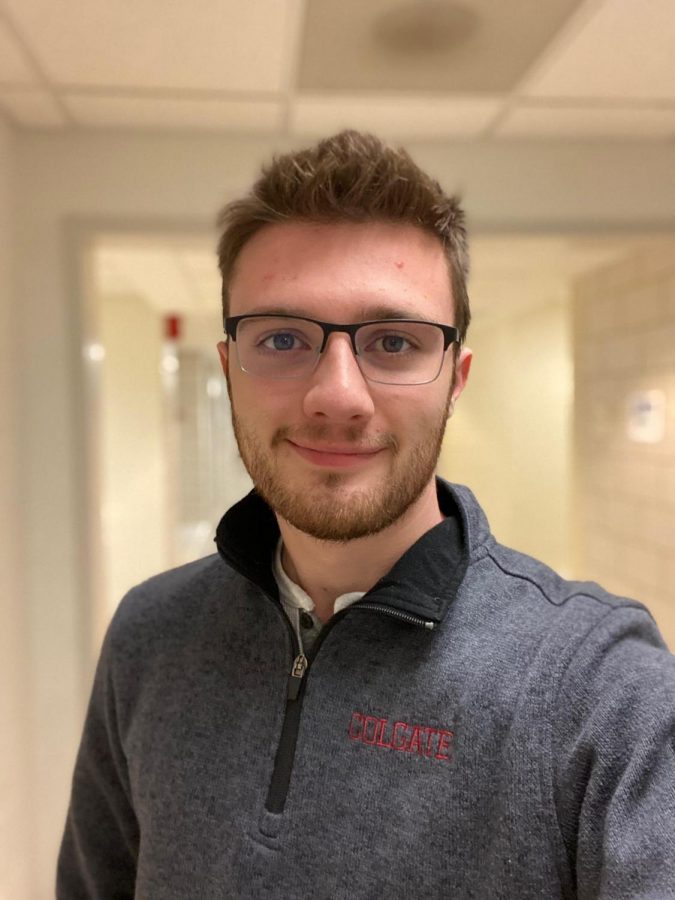Grant Ruback Spends Summer as SOMAC Volunteer
When classes were cancelled last spring and students were sent home, senior Grant Ruback, a molecular biology concentrator with a sociology minor, decided to return to Hamilton for the summer and volunteer for the Southern Madison Volunteer Ambulance Corps (SOMAC). Hailing from Hilltown, Pa., Ruback is a certified Emergency Medical Technician (EMT) for New York and Pennsylvania and is a member of the National Registry of Emergency Medical Technicians (NREMT).
“When the pandemic hit last spring, almost everyone saw their summer plans change. Internships were cancelled or moved online, and many states across the country entered some type of stay-at-home orders. I had originally planned to be at the National Institute of Health from May to August doing research. When that was cancelled, I wanted to still do something with my time that would directly contribute to my community. Since I already have experience as an EMT and training at SOMAC, I decided to resume volunteer EMS service for the summer,” Ruback explained.
Ruback stayed from early June until the first week of August. Volunteering for the summer involved more than picking up shifts as an EMT. He and senior Kailey Jackett, another student EMT who stayed for the summer, found themselves helpful to SOMAC and the Hamilton community in more ways than one.
“In addition to going on calls and transfers, duties at the station included general station upkeep, cleaning and community awareness. As volunteers, [Jackett] and I would attend the Farmers’ Market with an ambulance on Saturday mornings and distribute free masks and hand sanitizer on behalf of SOMAC,” Ruback said.
According to Ruback, COVID-19 has transformed the way first responders handle Emergency Medical Services (EMS) calls. Extra precautionary protocols are in place in order to best protect both first responders and their often immunocompromised patients during emergencies or hospital transfers.
“We now have to wear masks at all times when we are in the ambulance with another crew member, even if we do not have a patient. If there is a patient, surgical masks must be worn at a minimum,” Ruback said. “We have an added assessment that we perform for patients on scene to determine if wearing greater PPE [Personal Protective Equipment] is necessary, such as N95 masks, goggles and gowns.”
Ruback explained that it was challenging to get a read on whether any of his patients were infectious with the virus, since all testing and diagnosing is performed at the hospital. Instead, precautions were taken to a higher degree when patients exhibited certain COVID-like symptoms.
“There were a few patients that I had seen in which COVID-19 had not been ruled out as the cause of illness. In these instances, we would switch out our standard surgical mask with an N95 or P95 mask (with the appropriate filters). We would put on something to cover our eyes, either goggles or a face shield. Gowns were also available to keep uniforms clean. After transporting a patient displaying any symptoms of COVID-19, we were able to clean the ambulance with a new Ozone sterilization machine, after we wiped down all surfaces with disinfecting wipes. SOMAC also recently installed remote UV-C light fixtures, which can sterilize the back of the ambulance after this type of call,” he said.
Ruback has been volunteering for SOMAC since his first year at Colgate. He is back on campus for the fall semester and plans to continue volunteering for them. All student first responders who have successfully completed the mandatory universal quarantine are now eligible to respond to emergency calls.
Ruback made it clear that the new protocols and SOMAC’s commitment to providing the best PPE for its members make him feel safe responding to emergency medical calls.
“The agency has made a great deal of effort to ensure the safety of all of its members. We recently had orientation for all of our new and returning student volunteers and did fit-testing for N95 and P95 masks. We’ve also had training on how to appropriately handle a call in which COVID-19 may be suspected and how to use the sterilization equipment effectively to clean the ambulance,” Ruback said.
Ruback believes that student first responders are essential for the safety of all members of the Colgate and Hamilton community, particularly because students make up the majority of the SOMAC staff.
“A functional and well-staffed EMS team is definitely a necessity as Colgate continues with its reopening plan, and I’m really proud to be able to remain a part of SOMAC,” he said.
Ani Arzoumanian is a senior from Ridgewood, NJ concentrating in neuroscience with minors in creative writing and anthropology. She volunteers as a firefighter/EMT...






